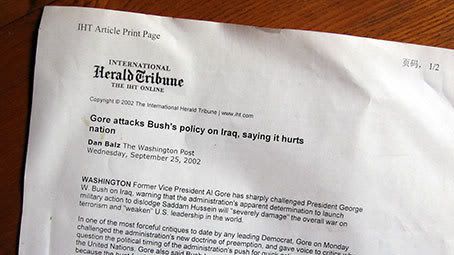
I recently did a cleanup, and found something interesting. A news printout from the International Herald Tribune (IHT), or 'Gore attacks Bush's policy on Iraq, saying it hurts nation', dated Sep. 25, 2002, by Dan Baiz of the Washington Post. (Just checked, and this article is somehow missing from the IHT archive.)
Back then, I used news articles like this one to train my English reading. Opposition to the war played a minor part in the choice of this particular article. Now it seems to be fate that I made the choice, since Gore's speech reads like a prophecy.
By shifting from his early focus after Sep. 11 on war against terrorism to war against Iraq, the president has manifestly disposed of the sympathy, goodwill and solidarity compiled by American and transformed it into a sense of deep misgiving and even hostility.How true. I was never positively thrilled by the disaster of Sep. 11, as opposed to the feeling of many Chinese when the incident occurred. I don't remember having any conscious disagreement to the war against the Taliban, despite the funny history of how the Taliban came into power. I would choice to dislike Saddam if I was asked to make a choice (although it was not my concern), and though I was not a fan of the Bush administration ever since they decided not to honour the Kyoto Protocol, I was to some degree with the US since Sep. 11. But not after the start of the Iraqi War.
But I'm not going to make any more moral judgments on Bush or the past US administration. Moral standards are difficult to handle, especially in international politics.
The point is that people knew the War was wrong, and did not stop it from taking place. In 2002 there were of course arguments, and arguments went on while decisions were being made. Only six years later does a clear judgment come forward, and Bush was mostly wrong. One cannot but feel that this comes too late.
It is all possible that Gore attacked Bush out of partisanship. This review from the Economist's View is more revealing, but maybe Paul Krugman can also be ignored for being partisan? After all, Dick Cheney is now attacking Obama, and who knows? Maybe he's right?...
Yet I would say NO to Cheney, though I do not yet know if Obama is doing the right thing against terrorism. Although I admit that judgments are hard to make, especially concerning things that has not yet happened, it is relatively easy to spot the fault; and the fault in the Bush administration is their conservative origin--to idealistic to deal with reality. Such moral arrogance was also present in the North Korean talks. And now Cheney is not ready to give it up.
I'd very much like someone to share their way of foreseeing the "truth", but at least for now, this is still mission impossible for me. However, this should not prevent people from trying their best at making decisions, as long as they are dealing with the real world, and not just fancies.



No comments:
Post a Comment